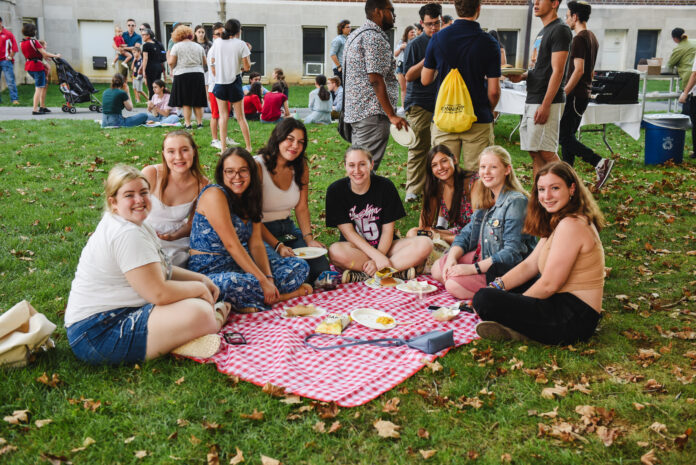In Dec. 2022, an Arts and Sciences study was conducted providing Muhlenberg faculty with feedback on how best to support students at the College. The study encouraged the administration to “think about ways to further help students make their impact, offer a balanced experience of challenge and support, and further deepen students’ overall sense of belonging,” says Associate Dean of Students Courtney Stephens. Additionally, with new curriculum changes and initiatives by the Career Center, they “wanted to think about ways that [they] could tie all of those things together for students in a powerful way.” Thus, a three-tiered coaching model was created.
This semester, all first-year students were matched with a designated member of the Career Center staff, an administrative staff member to serve as their “life coach” and a member of the faculty as their traditional academic advisor. Students were connected with their coaches through their Personal and Professional Development (PPD) courses. According to Stephens, “The Career Center staff teaches one of the weeks of PPD 050 to help demystify the career development process, as well as talk more about the many resources and opportunities the Career Center has for first-year students.” Students are also required to meet with this staff member once during the semester through an appointment made with the Career Center. “However, after their first required meeting, they can choose any member of the Career Center team to work with for future appointments,” added Assistant Director of Career Coaching & Education Sara Weidner.
In their presentations to PPD classes, Career Center staff members discuss the Muhlenberg Action Plan (MAP). Per the Career Center website, “The Muhlenberg Action Plan (MAP) is a unique program that allows students to harness the power of their liberal arts degree to ensure success throughout their time at Muhlenberg and beyond.” Weidner expanded, stating that the program “contains reflection prompts, activity pages and resource pages to support the process of figuring out what [students] might want to study and where [they] want [their] career to go based on [their] personal interests and values.”
“Every single first-year MAP appointment is completely individualized to that specific student,” Weidner adds, having already scheduled over 100 of these meetings. “In the first-year MAP appointments, we start by discussing students’ specific career goals and interests, then I provide any resources I’m aware of on campus that I think could support them.”
As has always been the case, first-year students are assigned to an academic advisor through their first year seminar (FYS) courses. “As faculty, academic advisors interact with students in their classes, but while there are similarities and some crossover between teaching and advising, teaching and advising are not the same thing,” commented Senior Lecturer in Religion Studies and Director of Academic Advising Sharon Albert. “Academic advisors work more holistically with their advisees than we can in the classroom, helping students navigate the academic program as a whole and also ensuring that they know what other resources are available to them and how to access those resources.”
The final of the three first-year coaches is the college life coach. “Also through PPD, students are assigned to meet with their college life coach twice in their first semester,” comments Stephens. One of these meetings occurred in September for “initial check-ins,” with a second one set for November. “By this point, the goal is for college life coaches to help students begin setting larger goals for their time at Muhlenberg based on their interests, strengths and values.”
“Faculty work with students in large groups, but there are many others on campus who spend at least as much time with students as faculty do, and for many students their go-to person on campus is as likely, or more likely, to be someone on the College Life team than faculty,” Albert added, acknowledging that students tend to have more access to college life staff members than faculty, which may make them more inclined to meet with their college life coaches.
Director of International Student Support, PPD Instructor and College Life Coach Thomas Janis says that his meetings are “all about where students are currently at the moment and what types of resources they could benefit from knowing.” He continues, “I’ve had discussions ranging from how withdrawing from a class works and the implications of that process, to talking about joining clubs like the outdoors club and other org[anization]s, to learning a student has a twin and connecting them with our colleague in the office who is also a mother of twins, so they had a chance to connect with a nice chat.”
Janis adds that students are required to submit reflections about their experiences within this new coaching model through their PPD courses. “These reflections continue to help foster self-awareness and personal development and align with the broader goals of the PPD course.”
Students seem to be pleased with their coaching experiences. Emma Howson ‘27, who was matched with College Chaplain Reverend Janelle Neubauer, stated that “I only met with her because it was required for my PPD class, but I’m really glad I did. We had a nice chat about what it means to be a college student.” Howson reflects that the conversation was similar to that of a family member—personal, warm and welcoming.
With most coaches being matched randomly, some students were connected with faculty members with whom they already had a strong relationship, including athletes. Alyssa Hartnett ‘27 was matched with her lacrosse coach, Morgan Graham, “which is cool, so I know them on the academic side as well as the athletic side.” While agreeing that their meeting was scheduled as a requirement, she comments on this being a positive experience. “[W]e talked about life and transitions to college academically and athletically.”
Sam Roberts ‘27 was also matched with his coach, Men’s Soccer Coach Sean Topping. “We met and it actually was really helpful. We talked about making sure that I had an easy adjustment coming to the College– life in the classroom, on the field and socially, that I had a good environment outside of the team… It was nice talking to him as a mentor and someone I can reach out to.”
Janis concluded that “It’s heartening to know that most of the first-year students I connected with have stated that they’d give their first few weeks of life at Muhlenberg a 4/5,” and that as a college life coach, “it’s been nice to learn about the perspectives from other first-year students.” Albert also noted the ways in which this new initiative brings ease and aid to academic advisors: “Academic advisors now can feel more reassured that there are a number of folks watching out for the students they are advising.”
Upon hearing of the program during an orientation announcement, Orientation Leader Ariana Handelman ‘25 remarked that “It seems like a really good system,” but commented that it may be a bit overwhelming for students. She also added that “In the room, there were sophomores and juniors who expressed wanting a coach.” To that point, Weidner commented that “There will be a MAP for each class year eventually; the other three–sophomore through senior year– are still in development.” Weidner concluded with three main pieces of advice for all students: “1) Your major does not dictate your career, 2) Career development is a PROCESS, not a destination and 3) We’re your Career Center for life.” She encourages all students and alumni to maintain connections with the Career Center, and hopes that these one-on-one coaching sessions will be the starting point for that life-long relationship.
Harry Glicklin '26 is a media & communication and English double major who is absolutely jazzed to be both a Copy Editor and a writer for The Muhlenberg Weekly. Outside of ~the office~, Harry is a member of the Muhlenberg AcaFellas, Hillel and the WMUH Allentown radio station.























